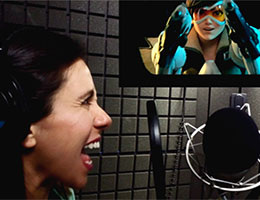 Dubbing is the procedure carried out to replace the voice of a television or film actor with a different one, whether in the same language or another. The practice is very common as a translation method.
Dubbing is the procedure carried out to replace the voice of a television or film actor with a different one, whether in the same language or another. The practice is very common as a translation method.
For example: “The young actor will be in charge of dubbing the main character of the new Pixar film” , “In my youth I developed a successful career as a dubbing actor ” , “I prefer subtitled films, I don't like dubbing” .
Dubbing consists of recording and replacing voices . The objective is to replace the dialogues recorded by actors in their original language with other dialogues that are similar or the same, generally in a different language.
Those who provide the new voices are known as dubbing actors . These interpreters must synchronize their utterances with those originally pronounced so that, when the actor on screen moves his mouth when speaking, the dubbing is heard as if he were expressing said speech.
Take the case of the animated series The Simpsons . In its original version, the voice of Homer Simpson (or Homer Simpson ) is provided by Dan Castellaneta . In Latin America , the dubbing of the character was performed by Humberto Vélez until the 15th season . This means that Latin American viewers, when watching the different episodes of The Simpsons , did not hear Castellaneta 's voice, but rather Vélez 's.
Sometimes dubbing is not done to translate the original language . When a character must perform a musical theme, for example, it is possible to use a singer to dub only that part of the story if the actor does not have sufficient skill or if his voice is not suitable for the piece.
Dubbing transcends the limits of the technique itself and the areas in which it is applied. Given the importance of fiction in the development of our species as a resource to exercise our imagination and expand our horizons, the way in which cinema and television reach us is decisive for our growth.
 While in some countries the majority of people reject dubbing in favor of the original voices of films and television series, in others it is the normal way in which they are consumed. This difference is crucial in the relationship that each person has with these creations and with the world in general.
While in some countries the majority of people reject dubbing in favor of the original voices of films and television series, in others it is the normal way in which they are consumed. This difference is crucial in the relationship that each person has with these creations and with the world in general.
Getting used to foreign content arriving translated and dubbed generates a feeling of security, since "we will always understand everything that crosses our borders." This comfort can become a double-edged sword if it leads us to think that we will never find ourselves in a situation where we have to make an effort to understand others or, worse still, to make ourselves understood.
But the "guardian angel" of dubbing is not with us when we travel abroad and destroy other languages or realize that we are not even able to understand basic expressions. Subtitles offer us a totally different experience , although it is far from perfect.
While the best way to enjoy any work is in its original language, subtitles do not litter the content with sounds that are not part of it. The main problem does not lie in the words but in the expressions and cultural issues that appear implicit, both in the language and in the settings: it is not possible to translate everything, neither by recording new dialogues nor by subtitling the originals, which is why it is a matter of choose "the lesser evil" to at least be able to enjoy a portion of the work.
